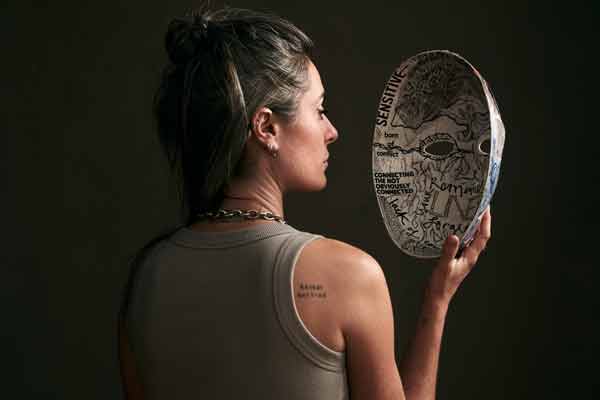To mark ADHD Awareness Month, we’ve launched a campaign to highlight how therapy can help people to navigate the emotional challenges of a recent ADHD diagnosis and masking.
Masking is where people learn to hide, disguise or suppress their natural behaviours, as they feel they’re not acceptable to people around them. But this can be exhausting, confusing and lead to damaging impacts, such as burnout.
Unmasking ADHD through therapy highlights this struggle through a series of powerful portraits. Each photograph features individuals with ADHD holding masks they’ve created which symbolise the contrast between their public personas, and traits and feelings they tend to mask.
The imagery is complemented by a short film that captures the process of creating these masks in an art workshop featuring four case studies and one of our members.
The campaign is part of our continuing PR work to help people find a BACP-registered therapist who can help them, and to highlight the skills and expertise of our members.
By bringing personal stories of masking and unmasking to life, the campaign aims to foster greater understanding of ADHD and masking, and promote the importance of therapy as a supportive resource.
We’ve shared the campaign with journalists and media outlets. It's already been featuring in national press and on a host of regional newspaper websites, including The Scotsman, Yorkshire Evening Post and London World.
See the portraits and watch the Unmasking ADHD through therapy film.
We’ve also released data from our annual Mindometer survey, which more than 2,600 of our members responded to this year.
The survey found:
- More than three quarters (76%) of therapists reported a rise in clients seeking therapy for ADHD-related issues in the past year
- 57% of therapists reported they often see clients masking their ADHD traits to avoid stigma
- More than half (58%) of therapists have noticed a rise in clients seeking their services to adjust to a new ADHD diagnosis.
- 72% of therapists say clients feel relieved after receiving a diagnosis
- Emotional regulation (82%), academic or work performance (67%) and relationships with friends and family (67%) are the top three areas of life that ADHD has the greatest impact, according to therapists
Lisa Morrison Coulthard, our Director of Policy, Professional Standards and Research, said:
“Through this campaign, we hope to highlight that therapy can be extremely effective in supporting individuals recently diagnosed with ADHD and especially with the sometimes complex emotional response that may follow. It’s not about ‘solving’ ADHD, but about helping people understand their diagnosis, address the challenges of masking, and live in a way that feels true to themselves.”
Our member Mark Redwood, who featured in the short film, added:
“ADHD can have a big impact on various aspects of a person’s life, on managing emotions and maintaining focus, navigating challenges at work or school, and sustaining relationships.”
“While people can feel relieved getting a diagnosis, it's often not the end of the journey. Diagnosis also brings greater awareness of the extent of strategies people have been using to cope, such as masking.
"Masking is a common strategy used by people with ADHD to avoid rejection and stigma, but it's exhausting and can often lead to burnout.
"Therapy offers a safe and supportive space to explore issues such as masking, where people can build confidence to try out masking less, and extend that into their everyday lives. Therapy can't fix ADHD, but it can help people build coping strategies, live more authentically, and learn to thrive with ADHD."

Unmasking ADHD through therapy
Our Unmasking ADHD through therapy campaign highlights the impact of ADHD through a series of powerful portraits.

Burst the self-doubt campaign launched with interactive art installation
Our campaign aims to highlight how therapy can help women with self-doubt and low self-esteem

R.A.I.S.E campaign helps spot signs of depression in men
We're highlighting how therapy can help men, as 56% therapists agree men are less likely to get mental health support than women
